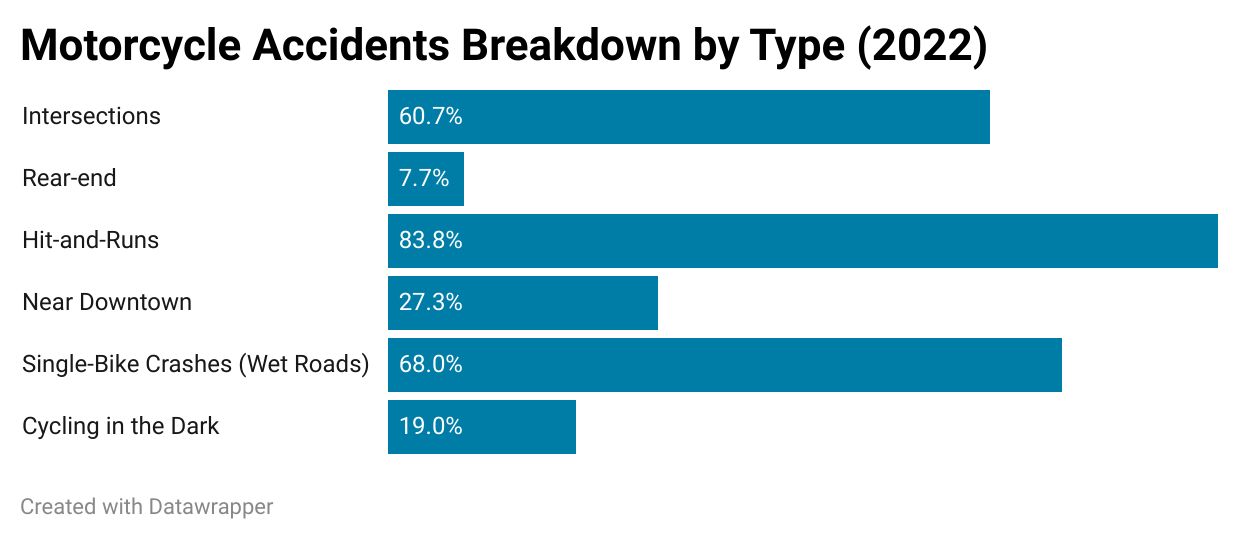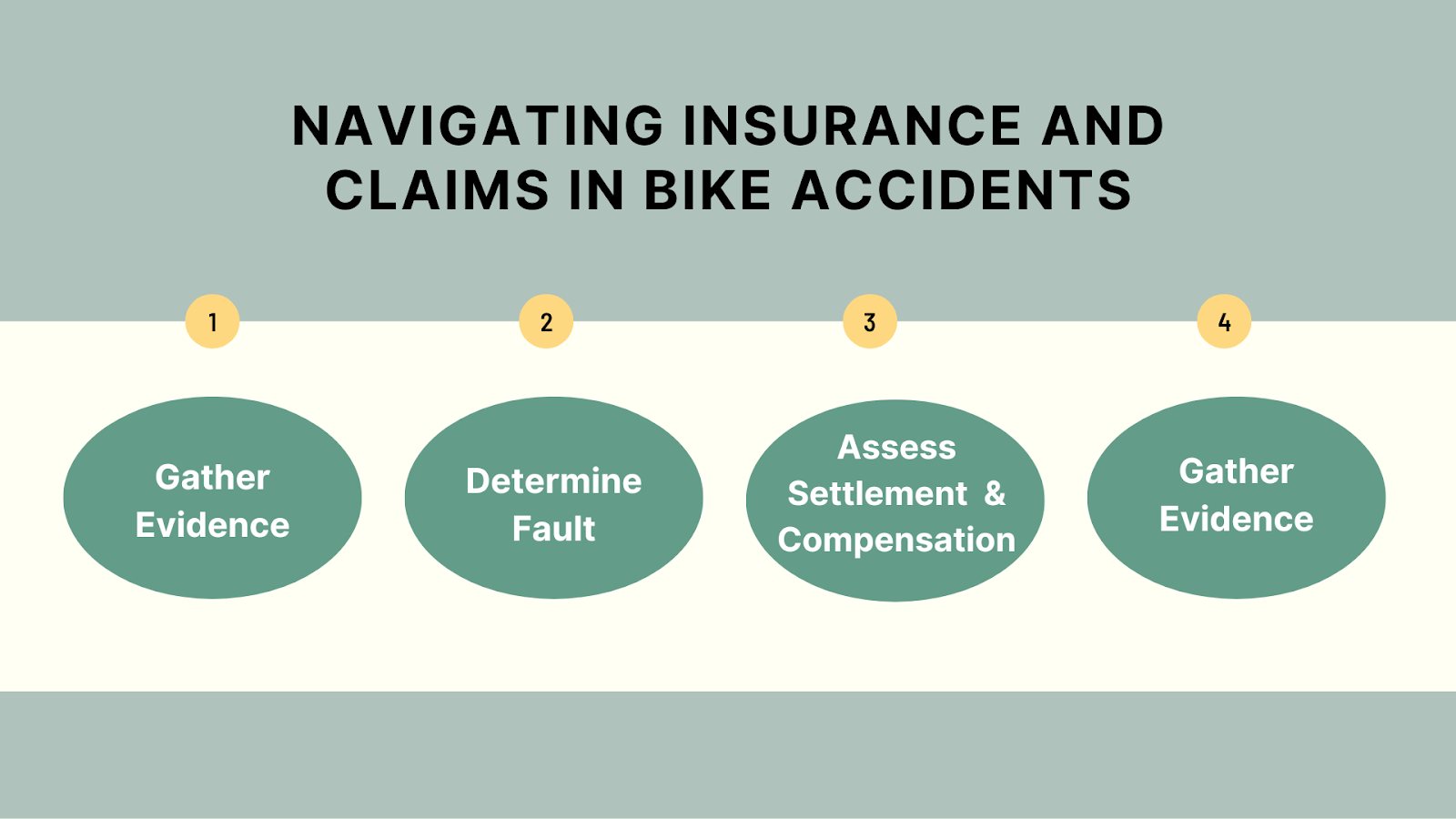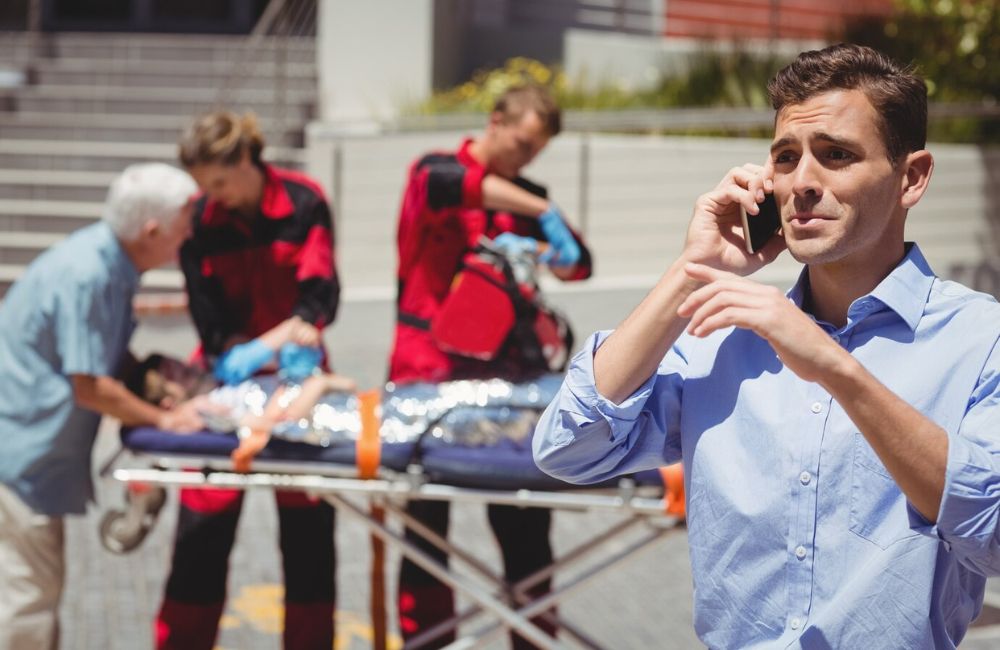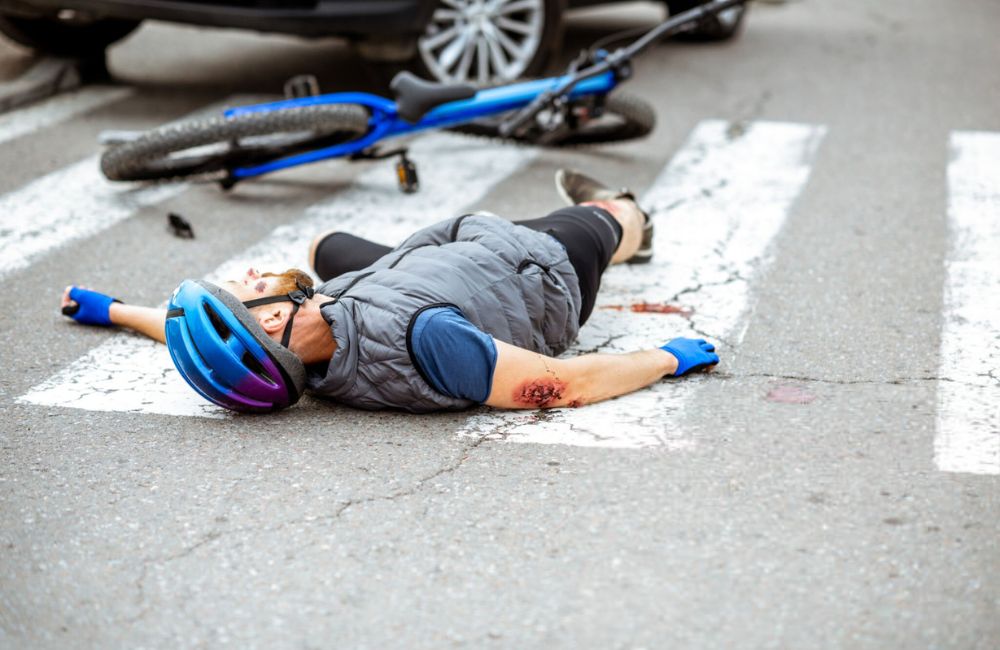The streets of San Francisco pose unique challenges for cyclists. As revealed by the Vision Zero report, 25 people died in traffic collisions in the city in 2023, up until December 19. This alarming figure underscores the risks faced daily by those navigating the city.
In light of the 377 bike accidents in San Francisco reported by TIMS in 2022, it’s essential to understand your rights and the local laws. Navigating the aftermath of bike accidents in San Francisco can be complex, and knowing how to handle these legalities is crucial. This guide aims to assist you through this process, providing the information you need to help you through the process with peace and confidence.
The Risks of Bike Accidents in San Francisco


San Francisco’s commitment to safer streets is embodied in Vision Zero, a citywide project with the ambitious goal of eliminating all traffic fatalities. Despite this mission, bike accidents remain a concerning reality in the city.
Here are some key factors contributing to the risks cyclists face in San Francisco:
- Dense Urban Traffic: The heavy traffic in San Francisco increases the likelihood of collisions between cyclists and vehicles, especially during peak hours.
- Limited Cycling Infrastructure: While there are dedicated bike lanes in some areas, many streets lack proper infrastructure, forcing cyclists to share the road closely with larger vehicles.
- Driver Distraction and Negligence: Incidents often occur due to distracted driving, such as using mobile phones, or drivers failing to yield right-of-way to cyclists.
- Road Hazards: Potholes, uneven surfaces, and dangerous intersections, such as the one on Market Street and Octavia Boulevard, can be particularly dangerous for cyclists, leading to loss of control or unexpected movements.
- Poor Visibility: Factors like fog, inadequate street lighting, or cyclists without sufficient reflective gear can lead to reduced visibility, increasing the risk of accidents.
The Legal Landscape for Cyclists in San Francisco


San Francisco’s legal framework for cyclists is designed to ensure safety and equality on the road. It’s vital for every cyclist to be aware of these laws, as they not only govern your conduct but also protect your rights in the event of an accident.
- Right to the Road: Under California Vehicle Code 21200, cyclists are granted the same rights and responsibilities as motor vehicle drivers. This means that cyclists are legally recognized on the road and must obey traffic signs and signals, just like drivers. Additionally, cyclists are entitled to the same legal protections as drivers, ensuring their safety and rights while cycling
- Helmet Laws: While adults aren’t legally required to wear helmets (California Vehicle Code 21212 applies only to cyclists under 18), doing so can greatly impact your safety and potentially the legal outcomes in an accident. Helmets are a critical safety measure and their use can sometimes influence the decision in personal injury claims.
- Lane Positioning: The California Vehicle Code 21202 outlines the expected positioning of cyclists on the road. When you’re moving slower than other traffic, it’s important to stay close to the right-hand curb or edge of the roadway, except in certain situations like overtaking, turning left, or avoiding road hazards. This law helps define your rights on the road and can be a key factor in determining fault in the event of a collision.
- Sidewalk Riding: The prohibition of cycling on sidewalks (San Francisco Municipal Transportation Code Section 7.2.12) for those 13 and older is primarily for pedestrian safety. Sidewalk cycling rules can differ between districts, so staying informed about your specific area is crucial to avoid legal pitfalls.
- Safe Passing Laws: The “Three Feet for Safety Act” (California Vehicle Code 21760) mandates that drivers maintain a minimum three-foot distance when overtaking a cyclist. This law underscores the need for mutual respect and safety on the road, aiming to reduce close calls and collisions.
Unexpected accidents can occur, leaving cyclists vulnerable. In such instances, knowing your legal rights and the steps to take post-accident is essential.
At The Personal Injury Center, we understand these challenges and are ready to help. If you find yourself in an unforeseen situation, don’t hesitate to reach out. We’re here to connect you with experienced personal injury lawyers who specialize in bike accidents in San Francisco, ensuring your rights are protected every pedal of the way.
How to Deal with a Bike Accident in San Francisco?
Experiencing a bike accident in San Francisco can be overwhelming, but knowing the right steps to take immediately afterward can make a significant difference, both for your safety and for any potential legal action. Here’s what you should do if you find yourself in this situation:
- Check for Injuries and Seek Medical Attention: Safety comes first. Assess yourself and others for injuries. Even if injuries seem minor, it’s crucial to seek medical attention. Some injuries, like concussions or internal damage, might not be immediately apparent.
- Move to a Safe Location: If you’re in the path of traffic and able to move, relocate to a safer spot. However, try to leave your bike and the accident scene undisturbed, as they can provide valuable evidence.
- Call the Police: Contact the police immediately, even for minor accidents. A police report can be vital for insurance claims and legal purposes. In San Francisco, Vehicle Code 20008 mandates reporting any accident involving injuries or death within 24 hours.
- Document the Scene: Take photos or videos of your bike, the vehicle involved, the accident site, and any injuries. Document street names, traffic signs, and environmental conditions. If there are witnesses, get their contact information.
- Exchange Information: Exchange names, addresses, phone numbers, and insurance information with the other party involved. Avoid discussing the fault or details of the accident with them; let the authorities handle it.
- Notify Your Insurance Company: Inform your insurance company about the accident as soon as possible. Be factual about the details but consult with a legal professional before giving a formal statement.
- Preserve Evidence and Track Expenses: Keep all documents related to the accident, including medical bills, repair receipts, and any correspondence related to the incident.
Navigating Insurance and Claims in SF Bike Accidents


Understanding the process of handling insurance and claims following a bike accident in San Francisco is crucial. This section breaks down the key elements and legal aspects that you should be aware of.
The Role of Fault in Claims
In San Francisco, determining fault in bike accident claims is governed by the principle of comparative negligence, as outlined in California Civil Code 1714. This legal framework is critical in understanding how compensation is awarded in personal injury cases, including bike accidents.
Essentially, comparative negligence means that if you, as a cyclist, are found to be partially responsible for the accident, the compensation you’re eligible for will be adjusted based on your degree of fault. For instance, if you’re deemed 30% at fault for an accident, the total compensation you can receive will be reduced by 30%.
Gathering substantial evidence is vital in these cases. The goal is to construct a clear and convincing narrative about what happened and who bears the majority of the fault. Key pieces of evidence include detailed police reports, which offer an official account of the incident, and witness statements, providing third-party perspectives of the events.
Additionally, any available camera footage, whether from surveillance cameras, dashcams, or bystander videos, can be invaluable. This visual evidence can often provide a definitive account of the sequence of events leading up to the accident.
Settlement and Compensation
When navigating settlements for bike accidents in San Francisco, the compensation can vary greatly, influenced by the severity of injuries and their impact on your life.
Settlement and compensation encompasses medical expenses, lost wages, and pain and suffering, each reflecting the immediate and long-term effects of the accident. The average settlement in California ranges around $30,000 for minor injuries but can escalate to approximately $100,000 for more severe cases.
It’s also essential to carefully consider initial settlement offers from insurance companies. An early settlement might cover immediate medical costs but overlook the extended financial and personal implications of the accident. A thorough assessment of these offers, with a future-focused lens, is crucial to ensure that any compensation aligns with the full scope of the injury’s impact on your life.
Filing a Litigation
Sometimes, reaching a fair settlement through insurance claims isn’t possible, leading to the need for filing a lawsuit. This is a critical step when negotiations stall, or when the insurance company’s offer doesn’t adequately cover your losses and damages.
Filing a lawsuit opens the door to potentially receiving more appropriate compensation through the court system. In California, the statute of limitations for personal injury cases, as per the California Code of Civil Procedure 335.1, is two years from the date of the incident. Missing this deadline can mean losing your right to file a lawsuit.
When Should You Contact a Lawyer Following a Bike Accident in SF?


In the aftermath of a bike accident in San Francisco, knowing when to seek legal assistance can make a significant difference in the outcome of your case.
Here are scenarios where contacting a lawyer is advisable:
- Complex Liability Cases: If determining fault in the accident is complicated, a lawyer can help unravel the complexities. This includes accidents involving multiple parties, unclear circumstances, or when dealing with aggressive insurance companies disputing your claim.
- Serious Injuries or Significant Damages: In cases where injuries are severe, leading to substantial medical bills, long-term care needs, or significant time off work, a lawyer can ensure that your claim adequately covers these expenses. They can also help in cases where there’s a dispute over the severity of injuries and their impact on your life.
- Insurance Settlement Offers: If you receive a settlement offer from an insurance company, it’s wise to have it reviewed by a lawyer. They can assess if the offer is fair and advise whether you should negotiate for a better one or proceed to litigation.
- Navigating Legal Complexities: Legal procedures can be intricate and overwhelming. A lawyer can guide you through the process, ensuring that all necessary documentation is filed correctly and deadlines are met, particularly important given the statute of limitations in California.
- Peace of Mind: Perhaps the most important reason to contact a lawyer is for peace of mind. Knowing that an expert is handling your case allows you to focus on recovery.
At The Personal Injury Center, we understand the challenges and uncertainties that follow a bike accident in San Francisco. Our team is here to help connect you with expert personal injury lawyers who specialize in bike accidents. They can provide the guidance and representation you need to navigate these challenging times.
Key Takeaways
|



